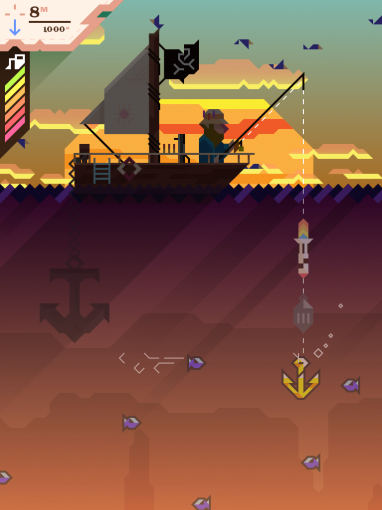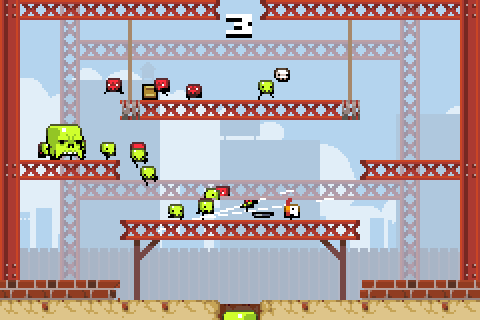
As Vlambeer was developing Ridiculous Fishing for iOS, a sequel to Radical Fishing, it got cloned.
Cloning has become a rising issue in video game development, especially problematic in social and mobile games.
(If you aren't familiar the original incident, here's a good primer.)
Head of business development Rami Ismail and designer Jan Willem Nijman were at the Game Developers Conference today to try and move the conversation on cloning forward. Their talk was less about what happened to Vlambeer, more about what the industry needs to do next in response. It was a talk with few solutions to cloning, but insightful commentary on the consequences of the practice.
"Game design is about problems and designing solutions to those problems," said Ismail.
The duo was unfortunately vague about what specifically constitutes cloning, but if you've seen Radical Fishing and the game that pulled from it, Ninja Fishing, it's clear we're talking about more than inspiration. The aesthetic is different, but the mechanics, including specifics like the upgrade path, are taken straight from Radical Fishing.
"We've been talking about clones in the industry for a really long time, but we haven't really made any progress because the entire discussion is filled with logical fallacies," said Ismail.
There are five main logical fallacies that Ismail and Nijman wanted to push back on.
One, clones are a necessity of progress.
"Clones are not a necessity," said Ismail. "We don't need clones to make new or original games."
Ismail pointed to the confusion of progress and iteration. The industry needs iteration, and iteration is not cloning. Ismail and Nijman were perhaps intentionally vague on specifics, however.
Two, simple games are bound to be cloned.
"Fuck that," said Ismail.
"If we ever get to that, just shoot me," said Nijman.
"I will," joked Ismail.
Just because this is might happen certainly doesn't make it okay, or something the industry should just accept.
Three, patents would ruin the industry.
"That implies that the alternative to having clones is a legal system that you take down clones through," said Ismail.
Ismail and Nijman said the idea of patents in the industry is a separate discussion, one that is tangentially related to the cloning debate but not at the heart of the matter.
Four, clones are free marketing.
"Um, yeah, no," said Ismail.
"Horrible, free marketing," said Nijman.

While Vlambeer should have been focused on making better games, the two of them were forced to confront a problem that looked to undermine much of what they were working towards. It also put them in the awkward position of attacking a fellow developer while also defending themselves, and realizing that whenever Ridiculous Fishing did come out, a certain section of players would think they were the ones who ripped someone off.
"When we release our game, we're going to get a lot of shit from people saying 'you ripped off that game!'" said Nijman. "That is my biggest nightmare. When we release that game, how are we going to handle that? That's not free marketing. That's like murdering yourself."
Five, clones don't hurt the industry.
"They do," said Ismail.
There are several ways cloning hurts the industry as a whole, they argued. It stagnates creativity, emotionally drains developers focused on making original works, and institutionalizes a "good enough" mentality amongst the players.
"If all the games people play are shitty games, they will think games are really boring and bad," said Nijman.
How to improve the situation isn't impossible, but it has an unclear path.
Ismail and Nijman suggested more developers try and illuminate the process of making video games to their audience. Indie Game: The Movie and Double Fine's Kickstarter-funded documentary are steps in that direction, they pointed out, and said to the press (hey!) about the struggles of game development will go a long way towards building sympathy with the audience. If your audience cares about cloning, they'll fight the battle for you.
"People don't realize games are made by people," said Ismail.
"We can't keep pooping out original games for the companies to steal from us," said Nijman. "Creativity is [not in] infinite supply."

Log in to comment